|
Stories and Letters
For
the family of
Joseph Barney Reed and Mary Ann Pickett
Number
|
Name
of Source
|
Repository
|
|
|
1 |
1853 letter to Grandfather
Pickett from Mary A Reed (wife of Joseph Barney Reed) |
in possession of Mark Reed
|
(see actual letter and transcriptions
on the next 4 lines below) |
|
page 1 actual image
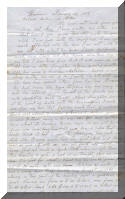 |
Page 1 Transcript:
Hanover, Michigan
January 23, 1853
Beloved Father and Mother
We have not herd from you since
last May. I have written one letter-since that time to you besides this.
We wrote to you while I was sick with the enysiplafs. (Erysipelas) I am
yet much afflicted with the same. I am not able to doe but little about
the house. I have suffered much since I have had this disease more than
any one can tell. I some times fear that it will ware me out.
We have a little Daughter
between 2 and 3 months old. Her name is Caroline Matilda. Sarah is not
verry healthy. The rest of the family are all well.
We have had several letters from
Caroline Brown the past season. She sayes Stephen has ben verry sick with
the Tiphoid fever. The rest of the friends are all well excepting Uncle
Cades Allenís Daughter wo laid at the point of death with the
consumption.
I wrote to you in my last that
Caroline wrote that Grandma Lewis was about to receive six thousand
dollars for Grandfatherís being in the war. She has said nothing since
about it.
Caroline Brown says she had not
herd from you in a long time. We have ben in hopes that you would think
it best to come to Michigan this fall. We still like it verry much here.
The grist-mill and store near us goes off well. We can get goods here
about the same that we could in York-State when we left there. This
country is quite as good as we thought when we came here. It is good for
wheat. Wheat has been worth from 65 to 93 cents. Oats and potatoes 43
cents. Corn was a verry poor crop. Hardly any bought or sold. Many in
this part of the country have a good deal of fruit. Horses are from 60 to
100 dollars. Oxen from 50 to 80 dollars. Land sells from 10 to 15 and 20
dollars acre. Farms with a log house, young orchard sell
|
|
page 2 actual image
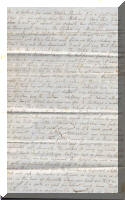 |
page 2 transcript
for 10 dollars per acre.
Joseph thinks it is a first rate
place for an ashry near the mill and store. This place is not yet named.
We exspect the post-office will be there next spring.
The people of Michigan have ben
wide awake about politicks this fall. Many have left the Democrat and Whig
Parties and formed themselves into what they call the free-democrats. I
will just say that Joseph takes the Free Democrat paper.
The people here are preparing for
a fare in Jackson-burg. The Californa fever has raged here. A number of
our neighbours went last spring. I have heard that Hosea Brown went to
California. I suppose that you noe that he lost his little James. He got
some grave stones for Hannah and James before he left Dansville.
Caroline wrights that there has
ben much sickness there the past year. There has not ben scarsely any
sickness here since we came here and very few deaths. Our children had
had the chicken pox this winter. Six children go to school. Mary Electa
taught school last summer for 12 shillings a week near home. This winter
she teaches school for 2 dollars a week in the same district where she
taught one year ago last summer. Michigan is doing much for schools. You
will see that my little William has scribbled my paper yet I will not lay
it aside as it is hard work for me to wright.
Now Father as we extend our
acquaintance, we find more York State folks nearly all in these parts and
from near where we lived and many who are acquainted with Dansville. This
makes it very aggreeable for us.
I think that I told you that we
had 2 poor log houses on our place. We have repaired the largest one and
made it quite comfortable. Joseph paid 8 dollars a thousand for lumber.
There is no pine here. The lumber is basswood, whitewood and oak. The
timber is not near so large heare as it was in the town of Henrietta where
our land was that we sold, yet it is quite as good for wheat and some
think better. There is a considerable Burr Oak in this part
|
|
page 3
actual image
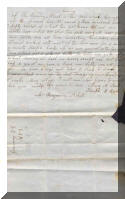 |
page 3 transcript
of the country.
Raising wheat is the principal
busness of the farmers here. We raised three hundred and fifty bushels of
wheat last season and our folks have sowed 25 acres this fall nearly all
new ground. Our folks done all there harvesting themselves and Daniel
worked out most of the summer for 6 dollars a month. Joseph broke up his
new ground with his own team which was 3 yoke of cattle. He sold one yoke
after wheat sowing.
We have no horses except one colt
(coming) 2 years we have 2 cows. Our cattle are all paid for. We have 6
hogs and taken 12 sheep to double in 3 years. Sheep is one of the best
things of our Country to make money out of.
I must now close. Please do
wright when you receive this.
Yours in love,
Mary A. Reed
Joseph B. Reed
|
|
Envelope
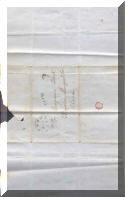
|
Envelope
transcript:
Mr. Benjamin Pickett
Kingston, Marquet Co.
Wisconsin
|
|
2 |
Story of William A. Reed |
in possession of Mark Reed. |
|
|
page 1
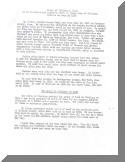
|
page 1 transcript
My father, Joseph Barney
Reed, was born July 25, 1807 in Cheshire County, Mass. He received
his education in the common district school, and lived there as I
remember, until he was 19 years of age. My mother was Mary Ann
Pickett and was born August 21, 1814 in Bradport, Vermont (her mother's
home). My grandmother died with consumption when she (mother) was
about six years old; then mother went to live with a merchant by the name
of Clark in Dansville, New York. Father and mother were married
December 24, 1832 at Union Corners, New York. Ten children were born
to them: six girls and four boys. All have passed to their rewards
except sister Caroline Weeks of Hanover and myself. Grandmother
Pickett, while sick and knowing she would never recover left a very
pathetic address to Grandfather Pickett, which is attached to this
history.
Father often spoke of buyers
bringing turkeys into the Boston market for Thanksgiving trade, and he
said when it became dusk the turkeys would take to the trees and they were
compelled to remain until morning. He said they would drive those
turkeys in great droves for miles and miles into the city.
Winters were very cold and
the snowfall very heavy. My father told of the drifts being over the
tops of the stake and rider fences.
He came with his parents to
Livingstown county, New York, four miles from East Nunda in 1826. He
lived in the state of New York until 1850. He came to Michigan in
1836 for the first time, and this is my story:
The Trail to Michigan in
1836
The state of Michigan
reduced the price of land in Michigan so that a man could purchase 80
acres of land for one hundred dollars ($100.00) or a dollar and a quarter
an acre. The price was reduced in order to encourage immigration.
My father purchased eighty
acres of land in the northwest part of Jackson County, moved here with an
ox team in 1836. He was twenty-four days in making the journey.
My mother rode all the way on a chest in the wagon and the children walked
along beside the teams most of the way.
Nights they stopped at the
Inns along the way. They did their own cooking and furnished their
own beds. In the morning they would pack up their goods and start on
their way. |
|
page 2
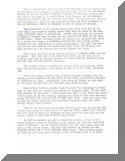 |
page 2 transcript
When we loaded the wagon to
start for Michigan father built a box on the back of the wagon to carry
the goods in. One of the neighbors, having an ox team he wished
brought through to Michigan, offered him the use of the team if he would
drive them through, but he declined thinking he wanted only one team on
the road. He soon learned that he had too much of a load for one
pair of cattle, and they journeyed as far as Cleveland, there he shipped
the box box goods to Detroit.
They journeyed on in company
with others when they got on the road until they reached Adrian, where
they left the rest of the company, who were going to Jonesville.
Father came through and visited a family of people whom he knew in the
state of New York by the name of Van Hess. While visiting there, he
called on a neighbor who lived in a double log house, no chinking
between the logs; young squaws standing in one part looked at them
continuously. He said they were not at all embarrassed, but never
took their eyes off of them, but kept peaking at them through the cracks
between the logs.
After they had been there a
while he went to Detroit after the box of goods. This trip had to be
made three times as the box had not arrived, and when he reached Detroit
the third time he found that the box had only reached Detroit that day.
The country being new there
was a great deal of sickness, which made Mother discouraged. She
wanted to return to New York, which she did.
Soon after, however, Calvin
Reed returned from Wisconsin to their home in New York and Father then
worked at chopping wood. He cut cord wood winters by the cord.
I have heard him tell of his doing his chores before daylight in the
morning, walking two miles to his work and averaging two cords of wood per
day of four foot wood. Many and many a day he ate his dinner from
his pocket without stopping work, his lunch nearly always being frozen.
Much of the land east and
around Union Corners was cleared by him. Moving from place to place
until the year 1850, during that time he had made several trips to
Michigan to look after the land and pay his taxes, coming on foot from
Detroit and return.
In 1850 he decided to come
to Michigan to live. They drove a horse team and wagon to Buffalo,
eighty miles, and took the boat from there to Detroit. On the
journey across the lake that night they met with a very severe storm.
The boat ran between an island and the Canadian shore and it was perfectly
calm there. They arrived safely in Detroit, and then drove through
to the northeast part of Jackson
|
|
page 3
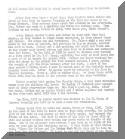
|
page 3 transcript
county. During
the storm Father said the high wind splashed the water on the horses and
they had to stand boards up behind them to protect them.
After they were here a short
time, they visited Rufus Palmer who lived at that time in Hanover Township
on the farm now owned by Mr. Frank Steward. They arrived there about
two o'clock in the afternoon. Mrs. Palmer was away at a quilting and
Rufus was husking corn. Upon looking up and seeing Father he said,
"God Bless you, Uncle Barney."
Rufus Palmer wanted Father
and Mother to stay with them that winter, as they wished to visit their
relatives, so they stayed there all winter. The house was all
furnished. Mr. Palmer said a man over south by the name of Babcock,
had potatoes to dig on shares, another had corn to husk. Father got
a job grubbing out small oak trees and in the winter made barrel staves
and drew them to jackson and exchanged them for flour. In the fall
of 1858 he moved to Jackson city working on a farm owned by Mr. S.C.
Knapp, adjoining the city at that time; now a part of it is inside the
prison wall. Father was night watchman inside the shops in the
prison for four hundred dollars a year, making the rounds of all the shops
looking after the fire. A part of the same school building where I
went to school east of the Catholic church remains there now. After
18 months there he returned to his farm in Hanover township. March
2, 1861 my mother died. We lived there until March 1864 when we
moved to the present home in the same township.
Father married that spring
Mrs. Charity Crego, a very kind Christian woman whom the children all
loved. No family of children ever thought more of their step-mother
than we. She died August 17, 1869. After her death, father and
my sister Carrie and I lived together and carried on the farm work until
1875 when I was married.
May 24, 1875, my sister
Carrie was married to Ira B. Weeks of Hanover township and left us to make
a home for themselves.
Father lived with us until
his death, November 21st, 1895. While in the most of his life he
lived face to face with poverty, the latter part of his life he had plenty
of this world's goods, and enjoyed the fruits of his labor. The last
18 years of his life he lived with my wife and myself without ever
having any harsh words or trouble of any kind. One of the pleasant
remembrances I now have is to think of the care we gave him in his
declining years. I then think of what Christ said, "Honor Thy Father
and Thy Mother that their days may be long in the land God giveth thee."
He lived to see all but three of his children buried.
|
Copyright 2009
Janet Hagan Monnin
jansgenealogy at gmail.com

 Email any comments to
Jan Monnin Email any comments to
Jan Monnin
This web site was last updated on
October 30, 2009
|
